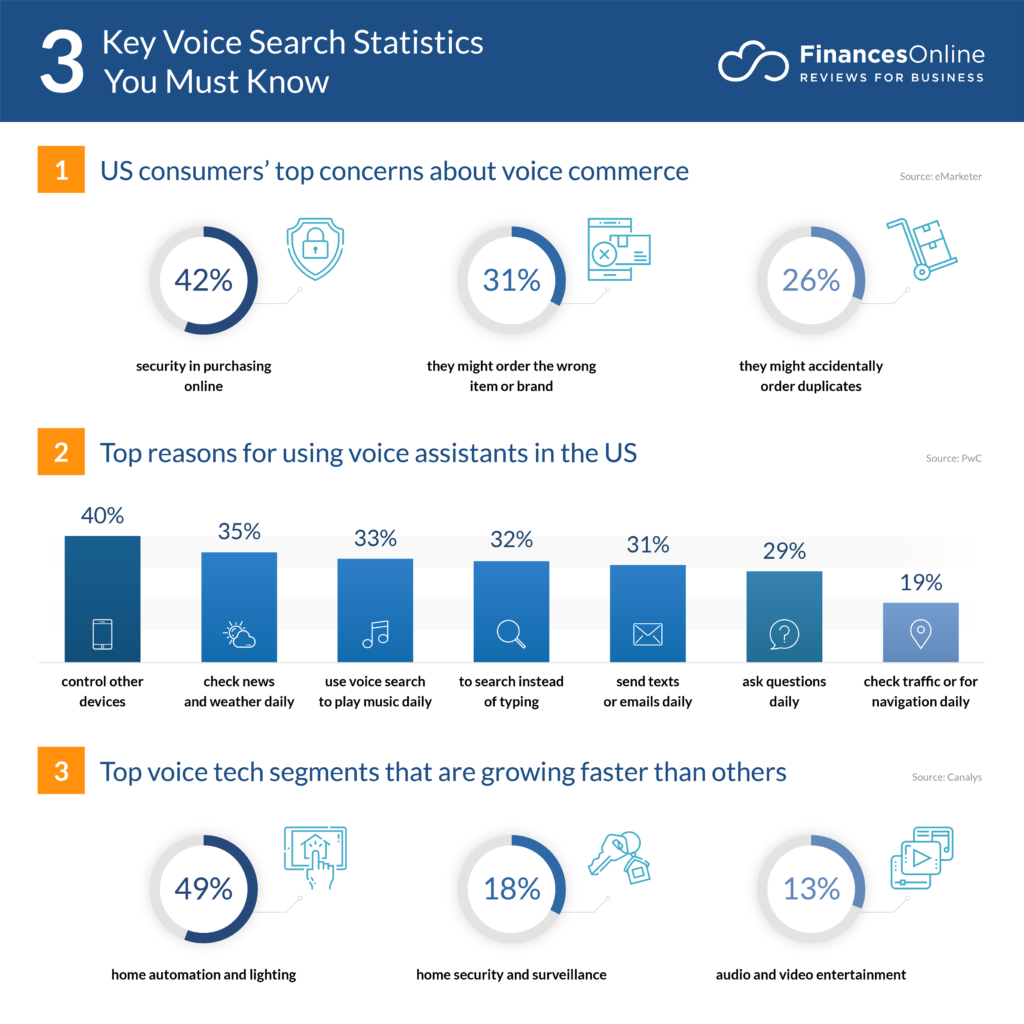Using your voice to search and shop online is called voice commerce.
According to Microsoft Market Intelligence research, 72% of respondents use voice search. This fact testifies to the additional opportunities that technologies open up for the development of e-commerce. Using voice commands to find and buy products online is called voice commerce. That is, the user informs his mobile device what product he needs, and the latter searches for it on the network. Smartphones and tablets with virtual assistants like Siri and Google Assistant, as well as smart speakers like Amazon Echo and Google Home, make it easier to interact with voice technology.
With their help, the consumer can view the content of the online store, ask questions, find out product ratings, check their availability and price, and place an order. Thus, the customer gets instant access to any supported catalog of the store in audio format and can browse the available products while doing other routine tasks. We are indebted to e-commerce and mobile commerce for making the shopping experience more convenient. However, voice commerce is the next step in improving the customer experience. Online shopping with technology can be more enjoyable.
According to Juniper Research, the number of digital voice assistants will grow to nearly 8 billion by 2023, an increase of a whopping 433% from 1.5 billion active devices in 2019. At the same time, more than 50% of voice assistants will be used for online purchases.

Some companies are creating their own voice assistant and building an entire ecosystem around it, inspired by the Amazon success story. Thus, the brand of Scotch whiskey Johnnie Walker uses a voice search function to explain to users the features of branded whiskey, as well as to establish a connection with the brand. They ask customers a list of questions about their preferences and then recommend the Johnnie Walker product that works best for them.
According to Microsoft Market Intelligence research, 72% of respondents use voice search. This fact testifies to the additional opportunities that technologies open up for the development of e-commerce. Using voice commands to find and buy products online is called voice commerce. That is, the user informs his mobile device what product he needs, and the latter searches for it on the network. Smartphones and tablets with virtual assistants like Siri and Google Assistant, as well as smart speakers like Amazon Echo and Google Home, make it easier to interact with voice technology.
With their help, the consumer can view the content of the online store, ask questions, find out product ratings, check their availability and price, and place an order. Thus, the customer gets instant access to any supported catalog of the store in audio format and can browse the available products while doing other routine tasks. We are indebted to e-commerce and mobile commerce for making the shopping experience more convenient. However, voice commerce is the next step in improving the customer experience. Online shopping with technology can be more enjoyable.
According to Juniper Research, the number of digital voice assistants will grow to nearly 8 billion by 2023, an increase of a whopping 433% from 1.5 billion active devices in 2019. At the same time, more than 50% of voice assistants will be used for online purchases.

Voice commerce: successful cases
Big e-commerce brands like Walmart, Amazon are already leading the way in the adoption of voice shopping solutions. So, Amazon customerscan use an Alexa-enabled device to search, order, and purchase products from Amazon using their voice. The word "Alexa" activates the device. For example, a customer says “Alexa, order” and the name of the item they want to purchase. Alexa checks the customer's saved purchase history and suggests products based on that history. If there are no such queries among the stored data, Alexa offers Amazon Choice products first. Then he announces the price and asks if the buyer would like to purchase it. If the answer is yes, Alexa places the order; if the answer is no, may suggest other options. If the search is in a category where Amazon has its own brand, Alexa recommends it 17% of the time.Some companies are creating their own voice assistant and building an entire ecosystem around it, inspired by the Amazon success story. Thus, the brand of Scotch whiskey Johnnie Walker uses a voice search function to explain to users the features of branded whiskey, as well as to establish a connection with the brand. They ask customers a list of questions about their preferences and then recommend the Johnnie Walker product that works best for them.
Using voice commerce allows businesses to:
- expand the customer base;
- improve their satisfaction;
- increase the conversion rate;
- Built-in analytics provide transparency and insight into shopping habits and customer loyalty;
- some solutions can scan voices to recognize and analyze their emotions;
- voice assistants are especially suitable for spontaneous purchases. For example, if you notice that you run out of hand soap, you can place an order with Alexa right in the bathroom;
- brands can influence the outcome through recommendations. After all, the consumer makes the final purchase decision among the recommended brands in the web cart.
